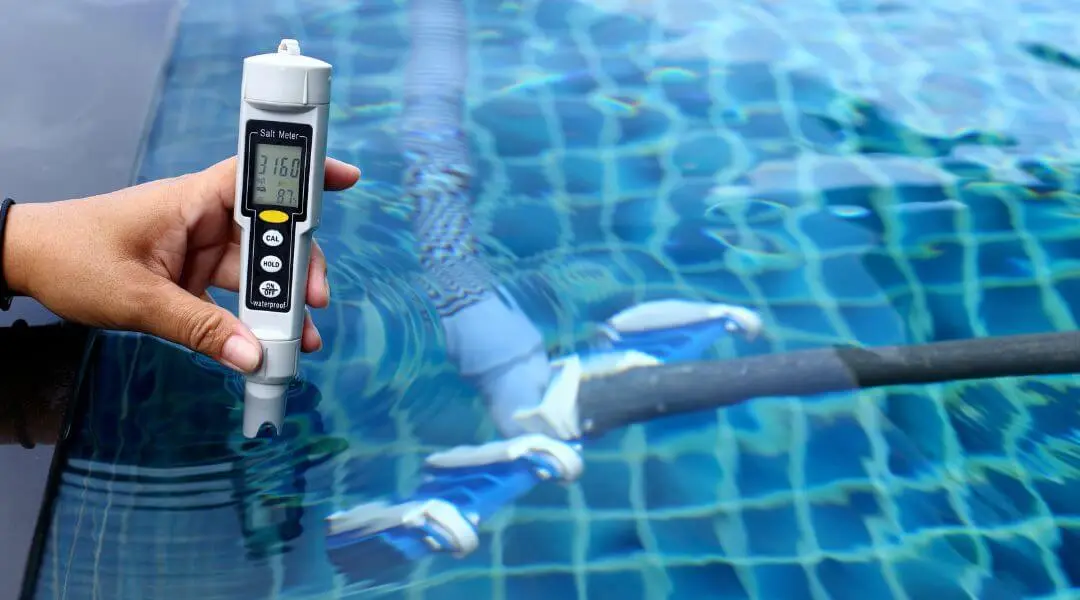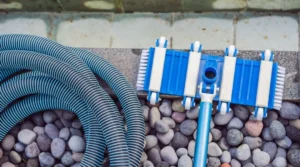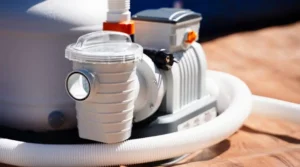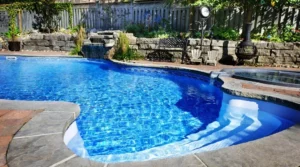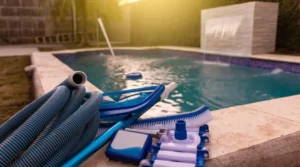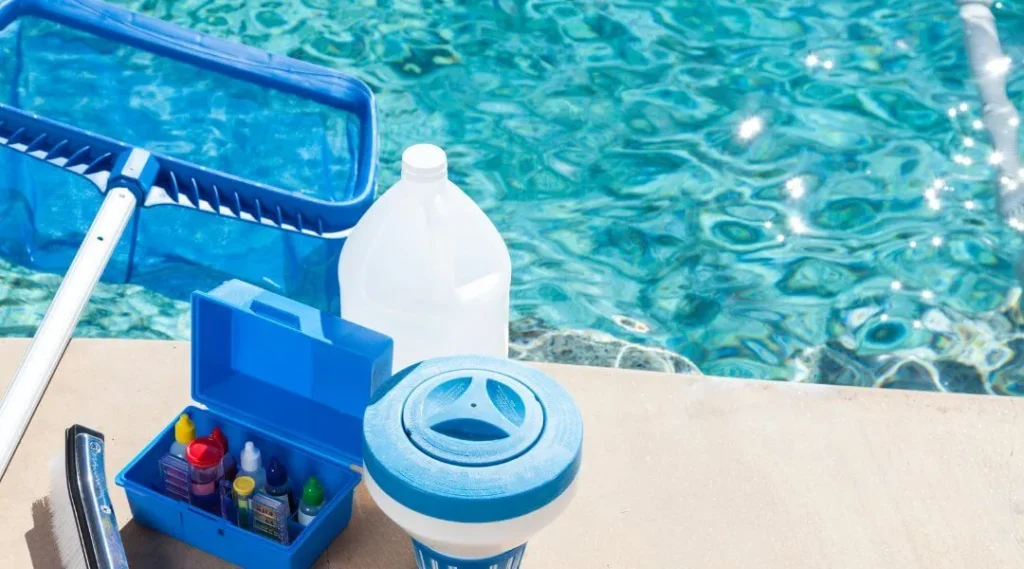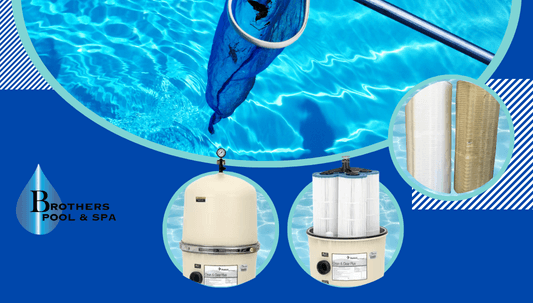If you’ve ever dreamt of having a pool that feels like swimming in the ocean but without the strong salt taste, then a saltwater pool might just be what you’re looking for. In this comprehensive guide, we’ll dive deep into the world of saltwater pools, exploring their chemistry, lifespan, cost, and more. By the end of this article, you’ll have all the information you need to make an informed decision about whether a saltwater pool is the right choice for you.
What is a Saltwater Pool?
A saltwater pool is a type of swimming pool that uses a salt chlorine generator to sanitize the water. Instead of adding chlorine directly to the pool, you add salt, and the generator converts it into chlorine. This process gives the water a silky feel and eliminates the strong chlorine smell commonly associated with traditional chlorine pools.
Contrary to popular belief, the salt taste in a saltwater pool is very mild and actually enjoyable. To ensure optimal performance, the salt level in the water should be around 3,000-4,000 parts per million (ppm), which is about 1/10th of the salinity level of the ocean. So, while it won’t taste exactly like seawater, it will still provide a pleasant swimming experience reminiscent of a teardrop or contact lens solution.
The Chemistry Behind Saltwater Pools
To understand how a saltwater pool works, let’s take a closer look at the chemistry behind it. When salt is added to the pool water, it undergoes a series of chemical reactions that ultimately result in the formation of hypochlorous acid, the compound responsible for sanitizing the pool.
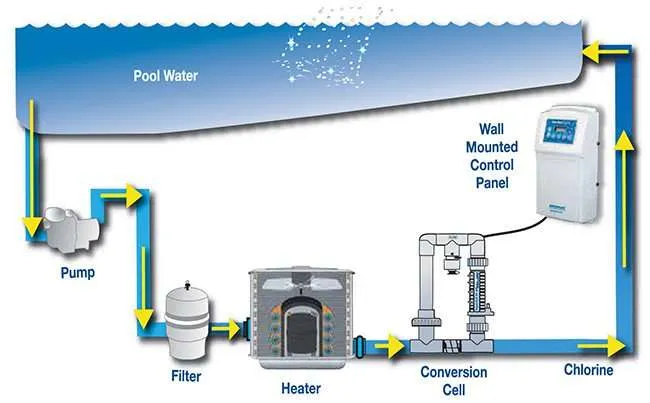
The process begins with the electrolysis of saltwater in the salt chlorine generator. This produces gaseous chlorine, sodium hydroxide, and hydrogen. The gaseous chlorine then combines with water to form hypochlorous acid and hydrochloric acid. Hypochlorous acid is the active ingredient that kills algae, bacteria, and other contaminants in the pool.
It’s important to note that the chlorine in a saltwater pool doesn’t actually come from the salt itself, but rather from the chemical reactions that occur as a result of the salt chlorine generator. This distinction is crucial for understanding the effectiveness and benefits of a saltwater pool.
Advantages of Saltwater Pools
There are several advantages to owning a saltwater pool:
- Clear, smooth water: The salt content in the water gives it a smooth and silky feel, making your swimming experience more comfortable and enjoyable.
- Lower annual cost: While the upfront cost of installing a salt chlorine generator may be higher than traditional chlorine, the annual maintenance cost is significantly lower. This is because you don’t need to purchase chlorine from a pool store regularly.
- No chlorine smell: Unlike traditional chlorine pools, saltwater pools don’t have a strong chlorine smell. This is due to the controlled production of chlorine through the salt chlorine generator.
- Gentle on skin and eyes: The lower chlorine levels in saltwater pools make them gentler on your skin and eyes. You won’t experience the typical redness, irritation, or dryness associated with traditional chlorine pools.
Disadvantages of Saltwater Pools
While saltwater pools offer numerous advantages, it’s essential to consider the potential disadvantages before making a decision:
- More expensive to replace parts: The components of a salt chlorine generator may need to be replaced periodically, which can be more expensive than traditional chlorine pool maintenance.
- Easy to neglect water testing: Since saltwater pools are known for their clarity and lack of strong chlorine smell, it can be easy to forget about regular water testing. Neglecting water chemistry can lead to imbalances and potentially damage the pool or its components.
It’s crucial to stay proactive and maintain regular testing and maintenance routines to ensure the longevity and performance of your saltwater pool.
Choosing the Right Salt for Your Pool
When it comes to selecting the right salt for your saltwater pool, there are a few options to consider:
- Solar salt: This type of salt is created by evaporating seawater under the sun. It may contain organic impurities and is typically less expensive than other options.
- Mechanically evaporated salt: This salt is produced by mechanically evaporating seawater. It may contain mineral impurities but is generally more consistent in quality.
- Mined salt: Mined salt comes from underground salt deposits and is often the purest option available. However, it can be more expensive than other types of salt.
Regardless of the type of salt you choose, it’s important to use salt that is specifically intended for swimming pools. Look for salt that is 99% pure or higher, granular, food-grade, and non-iodized. Avoid using rock salt or calcium chloride, as they can have adverse effects on water quality and pool equipment.
Maintaining a Saltwater Pool
Maintaining a saltwater pool is relatively straightforward compared to traditional chlorine pools. Here are some key points to keep in mind:
- Regular testing: Test your pool water regularly to ensure proper salt levels, pH balance, and chlorine production. Maintaining the correct water chemistry is crucial for the performance and longevity of your salt chlorine generator.
- Salt level adjustment: The recommended salt level for most saltwater pools is between 3,000-4,000 ppm. However, it’s important to check your specific salt chlorine generator’s rating, as some may have different range requirements.
- Cell replacement: The cell of a salt chlorine generator typically lasts 3-7 years, depending on usage and maintenance. Regularly clean the cell to prevent scale buildup and extend its lifespan.
- General pool maintenance: In addition to salt chlorination, don’t forget to perform regular pool maintenance tasks such as cleaning the pool, checking the filtration system, and inspecting all pool components.
By following a regular maintenance routine and staying proactive in testing and adjustments, you can ensure that your saltwater pool remains in optimal condition.
Cost of a Salt Chlorine Generator
The upfront cost of installing a salt chlorine generator typically ranges from $600 to $2,000. While this initial investment may be higher than traditional chlorine pool systems, the long-term cost savings are often worth it.
On average, a saltwater pool costs between $50 and $100 per year to maintain, which is significantly lower than the $250 to $300 annual maintenance cost of traditional chlorine pools. However, it’s important to note that the cost of replacing the cell unit, which typically occurs every 3-7 years, can range from $700 to $900.
Ultimately, the cost of owning a saltwater pool is comparable to that of a traditional chlorine pool, considering the long-term savings and benefits.
Lifespan of a Salt Chlorine Generator
The lifespan of a salt chlorine generator’s cell typically ranges from 3 to 7 years, depending on various factors such as usage, maintenance, and water chemistry. Proper maintenance, including regular cleaning and testing, can prolong the lifespan of the cell.
To maximize the lifespan of your salt chlorine generator, it’s essential to keep up with routine maintenance tasks and address any issues promptly. By taking care of your salt chlorine generator, it will take care of you by providing a clean and enjoyable swimming experience for years to come.
Compatibility with Pool Types
Salt chlorinators work best with fiberglass pools. They are also suitable for vinyl liner pools with polymer wall panels and concrete pools with a tiled interior surface. However, they should not be used in vinyl liner pools with metal wall panels, as the salt can corrode the panels and any galvanized steel components such as handrails and ladder anchors.
It’s crucial to consider the type of pool you have before deciding on a saltwater system. If you’re unsure which pool type is best suited for your needs, contact us today for a free quote and consultation to see how we can transform your pool experience to help determine the right option for your backyard.
Conclusion
In conclusion, saltwater pools offer a range of benefits, including clear and smooth water, lower annual maintenance costs, no chlorine smell, and gentle effects on the skin and eyes. With proper maintenance and regular testing, you can enjoy the advantages of a saltwater pool for years to come.
However, it’s important to consider the potential disadvantages, such as the cost of replacing parts and the ease of neglecting water testing. By staying proactive and following recommended maintenance practices, you can avoid these pitfalls and ensure the longevity and performance of your saltwater pool.
Ultimately, the decision to install a saltwater pool should be based on your specific needs and preferences. We hope this ultimate guide has provided you with the information necessary to make an informed decision and enjoy the benefits of a saltwater pool experience in your own backyard.
Thinking about making the switch to a saltwater pool? Contact us today for a free quote and consultation to see how we can transform your pool experience! It’s always best to consult a professional to ensure a stress-free conversion.
